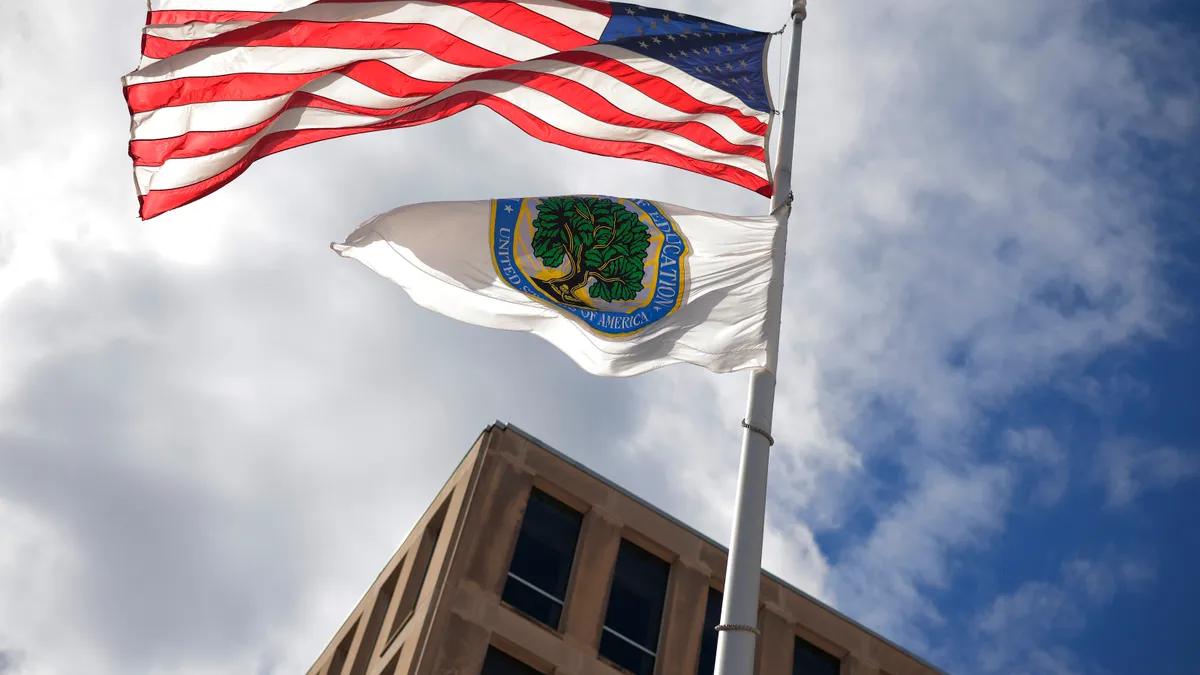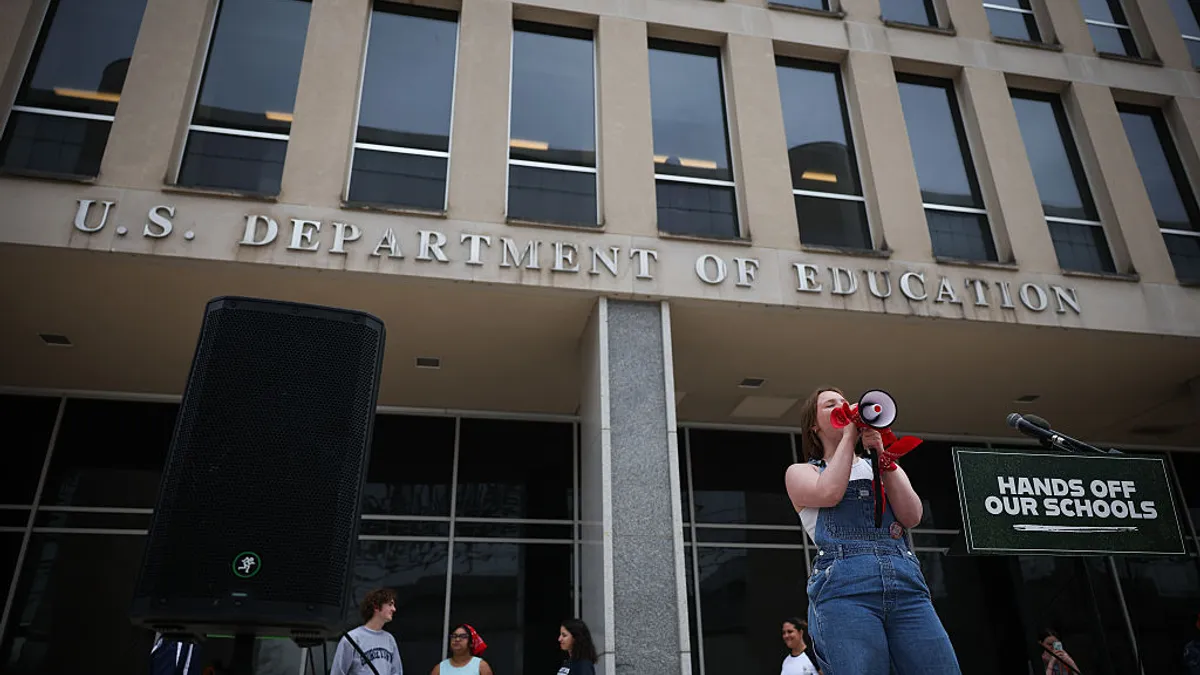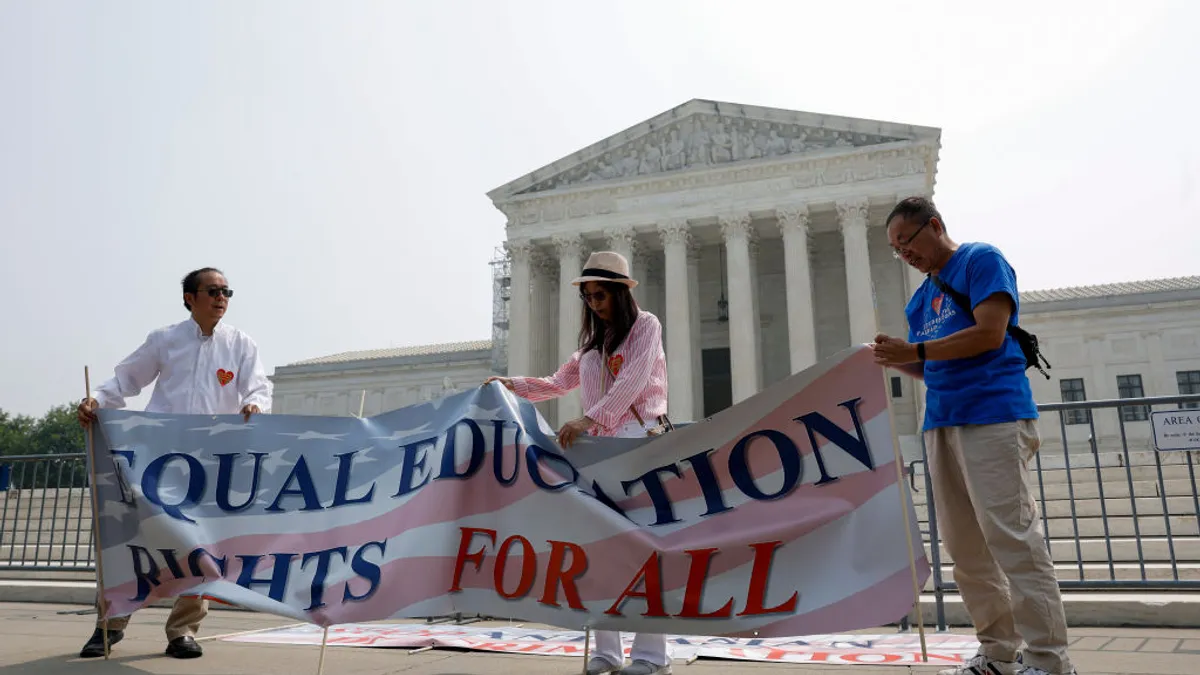At the beginning of the year, the Maine Department of Education was — like other state systems — bracing for changes to K-12 policies and practices that would come with a transition between presidential administrations.
But just weeks after inauguration, Maine had received multiple letters from federal agencies warning the state about its transgender athlete policies, become the target of multiple federal investigations, and teetered on the brink of losing potentially millions of dollars in federal funding.
The rapid twists and turns in Maine's case may not be unique. The U.S. Department of Education seems to be taking a new, more aggressive approach to its civil rights investigations — despite shutting half of its civil rights enforcement offices across the nation — as shown by communications from the department and the recent investigations themselves.
“To better serve American students and families, changes are being made as to how OCR will conduct its operations," Madi Biedermann, deputy assistant secretary for communications at the Education Department, said in a March 12 email to K-12 Dive.
In less than three months since President Donald Trump was sworn into office, the department’s Office for Civil Rights has launched targeted investigations into some of the nation's largest school systems, fast-tracked investigations with half the manpower, and moved to cut school systems off from federal funding.
The faster pace of OCR's work and its investigations' high stakes mark a significant shift for schools, which under previous administrations took months and even years of investigation and negotiation proceedings to settle federal probes. Rarely did schools have to grapple with cuts to federal funding as a result of civil rights investigations — and rarely did those investigations move so quickly.
"I think those days are over … We're definitely in unprecedented times," said Brett Sokolow, chair of education civil rights consulting firm TNG and president of the Association of Title IX Administrators. "It's a mess."
'It feels very, very targeted'
A harbinger of these changes came in the salvos launched by multiple agencies against the Maine Department of Education over alleged Title IX violations.
Triggered by a public spat between President Donald Trump and Maine Gov. Janet Mills about the state's transgender athlete policy in February — which ended with Mills telling Trump, "See you in court" — the Education Department launched an investigation into the Maine education system alongside a parallel probe into the state by the U.S. Department of Health and Human Services.
The investigation was "directed" — that is, it was initiated by the government without an allegation of civil rights violations from the public.
"All of these actions taken in concert in a very short window of time are coupled with directed investigations that are happening pretty rapid-fire," said Kayleigh Baker, a consultant with TNG. "And so it feels very, very targeted."
The HHS investigation into the Maine Department of Education concluded Feb. 25, just four days after it began, finding that Maine violated Title IX. The probe was then expanded on March 5 to include the Maine Principals’ Association and Greely High School. Less than two weeks after that expansion, on March 17, the federal agency found all three entities in violation of Title IX.

Two days later, on March 19, the Education Department ended its own investigation into Maine that had been launched just shy of a month earlier on Feb. 21.
Following in HHS’ footsteps, the Education Department also found Maine in violation of Title IX. The department, however, had hinted at the findings the same day it launched its investigation on Feb. 21.
“Let me be clear: If Maine wants to continue to receive federal funds from the Education Department, it has to follow Title IX," said Craig Trainor, acting assistant secretary for civil rights, in a Feb. 21 statement. Combined, the Maine Department of Education receives over $672 million annually from the HHS and Education Department as of 2023.
"If it wants to forgo federal funds and continue to trample the rights of its young female athletes, that, too, is its choice," said Trainor. "OCR will do everything in its power to ensure taxpayers are not funding blatant civil rights violators.”
In a statement that same day, Mills called the outcome of the investigation "all but predetermined."
Less than a month later, on March 19 — and after what a spokesperson for the Maine Principals Association described as a "targeted" investigation lacking interviews or any other investigative tools — the Education Department confirmed its own suspicions.
“The outcome of OCR’s investigation of MDOE confirms that it has violated federal antidiscrimination law by allowing boys to compete in girls’ sports and boys to occupy girls’ intimate facilities," said Trainor in a March 19 statement.
Circumventing its own standard 90-day timeline for school systems to sign such documents, the department would send a draft resolution agreement to the Maine Department of Education with a caveat: Agree in 10 days or lose federal funding.
'This is only the beginning'
The cascade of actions from multiple federal agencies into the Maine Department of Education, the quick turnaround of investigations into the state department, and the high stakes attached — including referring the case to the Department of Justice, another rarely used tactic — raised eyebrows in the education civil rights community.
"It's a very stark change in enforcement," said Baker. Prior to this administration, the department had very rarely rescinded federal funds for being out of compliance with civil rights laws. "It was a stick that existed out there …. but it wasn't one that was used."
The Biden administration said it didn't seek to cut funding from schools because that would ultimately harm students — who would lose services funded by the money.
“It’s a very stark change in enforcement."

Kayleigh Baker
TNG Consultant and civil rights attorney
“Under prior administrations, enforcement was an illusory proposition," said Trainor in a final warning issued March 31 to the Maine Department of Education. "No more."
Since Trump took office in January, his administration has canceled or threatened the cancellation of more than $9.5 billion for Ivy League universities over alleged Title VI and Title IX violations related to antisemitism and LGBTQ+ policies, threatened some 60 colleges and a handful of districts with additional loss of funding over allegations of antisemitism, and promised that "this is only the beginning."
“Freezing the funds is one of the tools we are using,” said Leo Terrell, head of the Department of Justice Task Force to Combat Anti-Semitism, in a March 7 statement related to Columbia's antisemitism case.
Threats to withhold funding have carried over to many other areas of civil rights enforcement by the Education Department.
On Thursday, for example, the administration threatened to withdraw funds from states unless their schools certify compliance with Title VI, including the elimination of diversity, equity and inclusion programs.
"Federal financial assistance is a privilege, not a right," said Trainor in an April 3 memo to states.
More of Maine on the horizon?
The Education Department's investigation into Maine’s education system was among the first in a string of investigations by the new Trump administration.
Investigations into other big education systems such as the California Department of Education — which was also directed — and Chicago Public Schools — launched after a complaint from conservative civil rights organizations — would follow. It launched a second directed investigation into Maine’s education department on March 28, this time for its reported use of gender plans allegedly violating privacy policies under the Family Educational Rights Privacy Act.
In these cases and others where funding hangs on the line, the administration has framed excluding transgender students from female athletics teams as a "women's rights" issue, and other LGBTQ+ issues like the use of preferred pronouns as alleged violations of privacy laws and parental rights.
"I think that we are going to see more of exactly what we're seeing with Maine," said Baker. "We're going to see a directed investigation, a finding of noncompliance, a short window to agree to change the policy or practice, followed by enforcement — probably to DOJ."
In Maine's case, a resolution agreement drafted by the Education Department would require the state education department to apologize to each cisgender girl impacted by the state policy allowing transgender athletes to participate on girls' teams “for allowing her educational experience and participation in school sports to be marred by sex discrimination."
“Federal financial assistance is a privilege, not a right."

Craig Trainor
U.S. Department of Education's Acting Assistant Secretary for Civil Rights
The department would also have to notify public schools and require them to adopt a policy that “females” are defined by “a reproductive system with the biological function of producing eggs (ova)” and “males” by having “a reproductive system with the biological function of producing sperm.” “Gender” would be the same as “sex” under the agreement.
When the Maine Education Department refused to sign the agreement, the administration said it was "moving quickly to ensure that federal funds no longer support patently illegal practices that harm women and girls." Maine was given until April 11 to sign the resolution agreement or have the case referred to DOJ with the state’s federal education funding potentially on the line.
The Maine Department of Education declined to comment on the case, which is now with the state’s attorney general. However, Mills made clear from the start of the Education Department investigation that she would be taking the case to court.
Since Trump’s inauguration, the Education Department’s Office for Civil Rights has launched and publicized at least seven investigations — a handful of which are directed and related to similar LGBTQ+ issues — into public school districts or systems as of April 3. All of the elementary and secondary education institutions investigated have been located primarily in Democratic-leaning areas.
By a similar time after President Joe Biden's 2020 inauguration, OCR had launched investigations into at least 33 elementary and secondary school systems across both Democrat and Republican-leaning areas. Those investigations, which remain open, came at a time when most were launched by the Education Department based on public complaints, and they covered a slew of civil rights issues ranging from disability discrimination to racial discrimination.
"We're part of a bigger experiment on executive branch authority."

Brett Sokolow
President of the Association of Title IX Administrators
The Education Department investigations are in line with the Trump administration's broader approach to enforcement, said Jackie Gharapour Wernz, a civil rights attorney who founded Education Civil Rights Solutions.
The administration is saying, "If you are a woke district out there, we are coming for you," Gharapour Wernz said about the current OCR's strategy. Gharapour Wernz was an attorney for the Education Department’s Office for Civil Rights under the Obama administration and Trump’s first term.
Sokolow said some of the current administration's decisions, however, are not unlike those made during past administrations. Under the Obama administration, for example, OCR head Russlynn Ali used the compliance reviews of at least six education institutions that the administration believed to be mishandling sexual harassment and assault complaints as a means "to scare everybody else and get them in line."
Department: 'investigations are conducted efficiently'
The department's decision to hit the gas pedal for civil rights investigations comes as half of OCR's regional offices were shut down due to department layoffs that shaved off half its staff. The OCR office shutdowns impacted half of states nationwide, leaving questions for how it will continue conducting thorough investigations and overseeing enforcement.
In fact, those limitations have already led to lawsuits from the National Education Association, the nation's largest labor union, and the American Federation of Teachers, as well as letters from Democratic lawmakers.
The Department of Education, however, told K-12 Dive in a March 12 email that "the dedicated staff of OCR will deliver on its statutory responsibilities.”
Biedermann confirmed that "OCR’s recently revised Case Processing Manual is designed to ensure investigations are conducted efficiently and no longer impose undue evidentiary burdens on both recipients and OCR staff."
She said OCR will step up its use of mediation and the expedited case processing approach, known as rapid resolution, to address disability- and harassment-related complaints.
Civil rights attorneys familiar with OCR operations have speculated that the agency may also depend more on HHS and the DOJ for enforcement. The Education Department formally initiated that shift last week, when it announced that the Justice Department would help investigate and ultimately enforce the separation of transgender students from girls’ and women’s athletics teams and spaces in schools and colleges.
"I don't think they're just trying to feed red meat to the base," Sokolow said of the Trump administration's aggressive approach to civil rights enforcement in education. "We're part of a bigger experiment on executive branch authority."







 Dive Awards
Dive Awards














